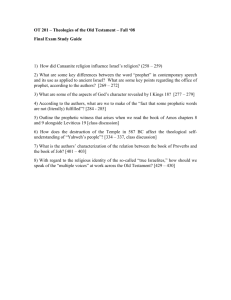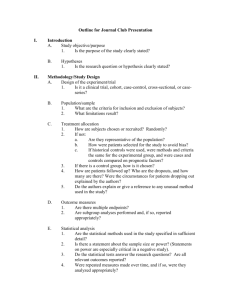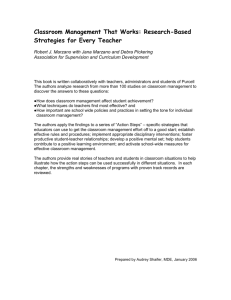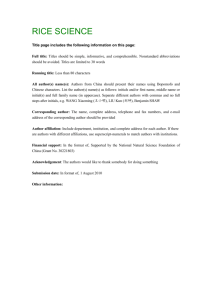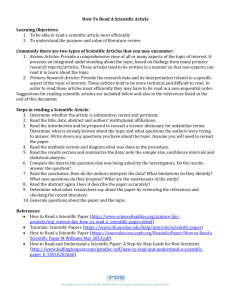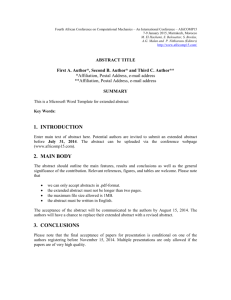New Testament Survey
advertisement
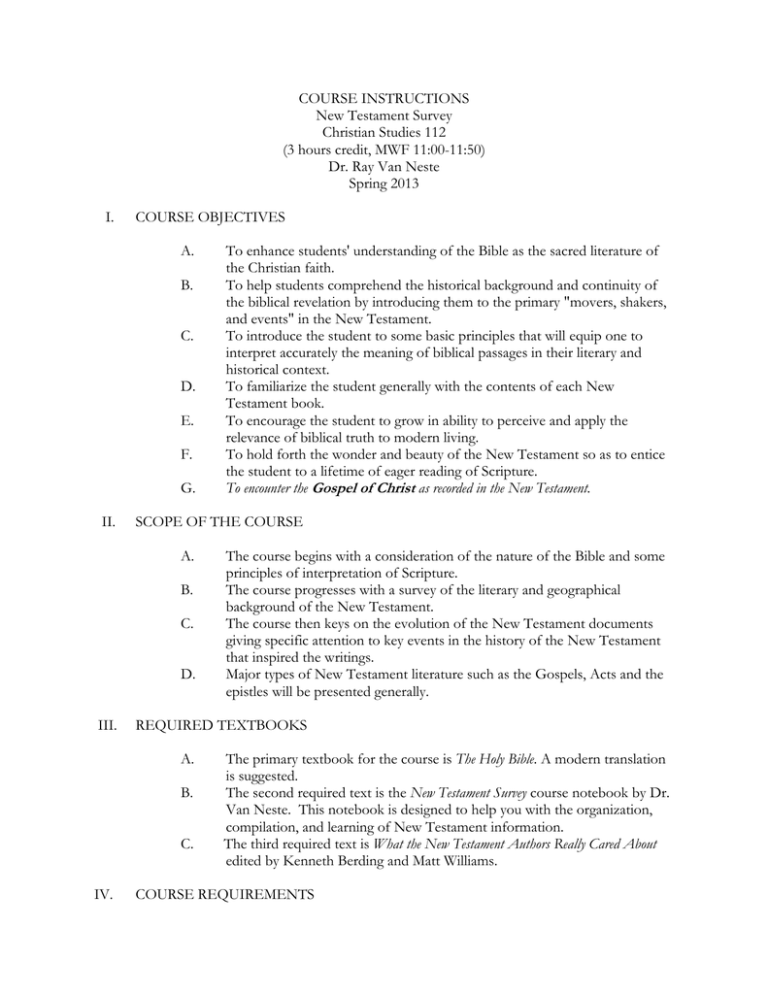
COURSE INSTRUCTIONS New Testament Survey Christian Studies 112 (3 hours credit, MWF 11:00-11:50) Dr. Ray Van Neste Spring 2013 I. COURSE OBJECTIVES A. B. C. D. E. F. G. II. SCOPE OF THE COURSE A. B. C. D. III. The course begins with a consideration of the nature of the Bible and some principles of interpretation of Scripture. The course progresses with a survey of the literary and geographical background of the New Testament. The course then keys on the evolution of the New Testament documents giving specific attention to key events in the history of the New Testament that inspired the writings. Major types of New Testament literature such as the Gospels, Acts and the epistles will be presented generally. REQUIRED TEXTBOOKS A. B. C. IV. To enhance students' understanding of the Bible as the sacred literature of the Christian faith. To help students comprehend the historical background and continuity of the biblical revelation by introducing them to the primary "movers, shakers, and events" in the New Testament. To introduce the student to some basic principles that will equip one to interpret accurately the meaning of biblical passages in their literary and historical context. To familiarize the student generally with the contents of each New Testament book. To encourage the student to grow in ability to perceive and apply the relevance of biblical truth to modern living. To hold forth the wonder and beauty of the New Testament so as to entice the student to a lifetime of eager reading of Scripture. To encounter the Gospel of Christ as recorded in the New Testament. The primary textbook for the course is The Holy Bible. A modern translation is suggested. The second required text is the New Testament Survey course notebook by Dr. Van Neste. This notebook is designed to help you with the organization, compilation, and learning of New Testament information. The third required text is What the New Testament Authors Really Cared About edited by Kenneth Berding and Matt Williams. COURSE REQUIREMENTS A. Attendance Requirement. According to the University catalogue, ‘regular and successive attendance is expected of all students in all lecture, laboratory, and seminar courses.’ Simply put, missing or skipping class hurts the student for several reasons. First, pop quizzes cannot be made up and will receive a zero grade if the absence is unexcused (see ‘Attendance Policy’ below). Secondly, the exams will be primarily based on classroom lectures. Even if you get the notes from a friend it will not be the same as being present in the class. Third, excessive unexcused absences will be penalized as follows: 3 classes missed – final grade lowered 5 points 4-5 classes missed – final grade lowered 10 points 6-7 classes missed – final grade lowered 15 points 8 or more absences – fail the class For Summer classes, each meeting is considered two classes. No student will be able to receive credit for the class if he misses 12 or more class meetings even if the absences are excused. The course is heavily dependent on what happens in class so that one who misses this many classes is not able to have completed the class. B. Quizzes. Pop quizzes can be given at any time. No quizzes can be made up. The student will be allowed to drop his/her lowest quiz grade (as long as the student has a sufficient number of quiz grades) C. Reading of the New Testament. The student will be expected to read the entire New Testament during the course of the semester. It will be best to pace this reading so as to be roughly in line with the class lecture. The amount of reading will be reported at the end of the semester for a portion of the grade. The Reading Report will be due on the final day of class (prior to finals week). D. ‘Mini-projects. Various ‘mini-projects’ will be assigned throughout the course usually involving contemplation or application of concepts discussed in class. These projects will be found on Blackboard (www.eclass.uu.edu). The last possible day to turn in any projects will be the final day of class (prior to finals week). E. Exams. Four major exams will be given. The material for the exams will be taken from class lecture and assigned reading. V. Grading for the Course A. The official grading policy of Union University as stated in the current College Catalogue will be employed for this course (unless the professor states otherwise). Grading Scale - letter grades will be given as follows: A = 95-100 B = 85-94 C = 75-84 D = 65-74 F = below 65 B. Determination of the final grade will be an average of the following sources: Three exams (15% each) 45% Final exam 20% Pop quizzes and projects 30% NT Reading report 5% C. Any late work will automatically be penalized 15 points and the penalty will increase the later the work is. D. Any papers turned in without a name will automatically be penalized 10 points. Such papers will be announced so that their owners may claim them. Any papers unclaimed after the class period announced will receive a zero. E. The student can keep up with his or her class grade by keeping a log of project scores and test scores. The professor will not provide averages or estimates during the semester except for the midterm grade. VI. SPECIAL PROJECTS A. Since this is a survey course no major projects or research papers will be assigned. B. Students should not plan this course as part of the Honors Program. C. The Christian Studies Department does not assign extra work to make up grade deficiency. VI. METHOD OF INSTRUCTION A. B. The lecture is the basic instructional approach of this course. Lectures are intended both to prompt students' questions and to encourage subsequent dialogue with the professor and fellow students. Small study-groups may also be utilized. Various visual aids will be employed to assist the student in the learning process. Periodic examinations are regarded as both instructional and testing measures. VIII. ATTENDANCE POLICY A. B. C. D. Regular class attendance is required for the successful completion of the course. The student is expected to attend classes regularly in keeping with the attendance policy of Union University (see the current College Catalogue). Class absences will be considered as excused or unexcused. Tardiness will also be noted. Three unexcused tardies will count as one absence. The student who misses an exam due to absence from class will be given a zero for the exam unless an acceptable written excuse for the absence is given to the professor. Only then may a missed exam be made up. A written excuse for class absence must be given to the professor at the next class attended after absences. It is the student’s responsibility to provide the instructor with the written excuse. If a written excuse is not given to the instructor by the time of the next class attended, the absence will be unexcused. E. F. G. Permission will be granted to take the make-up only to those with justifiable excuses such as emergencies, illness, bereavement, or official college functions approved by the Academic Affairs Office. The professor reserves the right to determine the validity of all non-college approved absences. Whenever a student has advance knowledge that a scheduled exam will be missed, the professor should be informed. In the case of an unexpected absence from an exam the student must notify the professor at the earliest possible opportunity, before the exam if possible. Failure to do so could result in a penalty. Excessive absences by a student will be reported to the Director of Student Support Services for counsel with the student. IX. POLICY ON CHEATING The Christian Studies Department strongly advises the student to heed college policy regarding the matter of cheating (see the current College Catalogue or Student Handbook). The professor enforces this policy. Cheating on any assignment will result in a grade of zero for that assignment. X. XI. ACCOMODATION STATEMENT In compliance with the Americans with Disabilities Act, I will make appropriate accommodations to meet documented needs. In addition, beyond the scope of ADA, there may be other accommodations that I would be willing to make given your individual situation or need. Please talk with me about your individual request following the first class meeting. APPOINTMENTS WITH THE PROFESSOR I heartily encourage you to make an appointment with me for any reason. I want to be available to assist you with any problem you may have. If you have an emergency or a pressing spiritual matter please come by my office or call me at home (664-9803) or at work (ext. 5532). Also, at your convenience come by and check my office schedule on the door in order to plan an appointment time (Jennings 341). I consider this semester both a great responsibility and a tremendous blessing. My desire is for us to learn together in an atmosphere of faithful devotion and hard work. The professor retains the right to alter any requirement or aspect of this syllabus at any time during the semester. (Student Information) Name: Church Affiliation: Box #: Phone (local): Home Town: What do you want to learn in this class? Are you dealing with any unusual circumstances at this time which could hinder your progress in the class? If so, please explain. Other comments: New Testament Survey Christian Studies 112; Spring 2013 11:00-11:50; C-6 Dr. Ray Van Neste Jan 30 Introduction to the class Feb 1 The Purpose of Bible Study (Projects 1-2) 4 The nature of the Bible (Project 3) 6 Introduction to the NT literature 8 The NT canon, Translations 11 Biblical interpretation 13 Political background (What the NT Authors…, p. 9-23) 15 The religious and social background of the NT (Project 4) 18 Intro to the life and ministry of Jesus Christ; extrabiblical sources, and the synoptic problem (Projects 5-7) 20 Introduction to the four gospels; Mark & Matthew (What the NT Authors…, p. 24-57) (Project 8) 22 Luke & John (Projects 9-10) (What the NT Authors…, p. 58-73, 88105) 25 EXAM #1 27 Foundational events setting the stage for Jesus' public ministry; preexistence (Project 11) March 1 4 Jesus' Birth (Project 12) Jesus baptism and temptations (Project 13) 6 Jesus public ministry: teaching, Jesus "top 8" teaching topics (Project 14-15) 8 Miracles of Jesus and the call and cost of Discipleship (Projects 16-17) 11 Passion of Jesus: Conflict, Last Supper (Project 18) 13 The Garden, Betrayal, Trials & Crucifixion (Project 19) 15 Resurrection (Project 20) 18 Exam # 2 20 Intro to Acts (What the NT Authors…, p. 74-87) (Projects 21-22) 22 Jerusalem (Project 23) Spring Break March 23-31 April 1 Easter Monday (classes out) 3 Judea & Samaria 5 Paul's background, call, and 1st mission trip (Project 24) (What the NT Authors…, 128-139) 8 Galatians, and Jerusalem Council (Project 25) (What the NT Authors…, p. 164-169) 10 2d mission trip and Thessalonian correspondence (Projects 26, 27) (What the NT Authors…,188-193) 12 3d mission trip (Project 28) 15 1 Corinthians (Projects 29-30) (What the NT Authors…, p.150-157) 17 2 Corinthians (What the NT Authors…, p. 158-163) 19 Romans (Projects 31-32), (What the NT Authors…, 140-149) 22 Paul from Jerusalem to Rome (Projects 33-34) Ephesians, (Projects 35-37) (What the NT Authors…, p. 170-175) 24 Philippians, Colossians, Philemon (Projects 38-39) (What the NT Authors…,176-87, 204-207) 26 1 Timothy, Titus, and 2 Timothy (Project 40-42) (What the NT Authors…, p.194-203) 29 EXAM #3 May 1 Intro to the general letters: Hebrews (Project 43-44) (What the NT Authors…, 208-215) 3 James, (Project 45) (What the NT Authors…, p. 216-221) 6 1-2 Peter, Jude (Project 46) (What the NT Authors…, 222-234) 8 1-3 John (Project 47) (What the NT Authors…, 106-111) 10 Revelation (Project 48-50) (What the NT Authors…, p. 112-127) Finals Week
